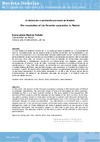Identificador persistente para citar o vincular este elemento:
https://accedacris.ulpgc.es/jspui/handle/10553/56233
| Campo DC | Valor | idioma |
|---|---|---|
| dc.contributor.author | Medina Peñate, Inmaculada | en_US |
| dc.date.accessioned | 2019-07-25T13:49:02Z | - |
| dc.date.available | 2019-07-25T13:49:02Z | - |
| dc.date.issued | 2017 | en_US |
| dc.identifier.issn | 1699-6569 | en_US |
| dc.identifier.uri | https://accedacris.ulpgc.es/handle/10553/56233 | - |
| dc.description.abstract | En este trabajo se analiza el léxico de la población peruana residente en la Comunidad de Madrid. Concretamente, se ha seleccionado el ámbito semántico de los alimentos y las bebidas, considerando que es un tema directamente relacionado con los hábitos cotidianos de la población, la pervivencia de sus costumbres y la adopción de nuevos hábitos del país de acogida. Para ello, se recurre a una muestra basada en entrevistas realizadas presencialmente a inmigrantes peruanos, complementada con algunos datos sobre circunstancias familiares, modo de vida y actitudes lingüísticas obtenidas a través de un cuestionario en línea. Esta información se contrasta con una muestra similar recogida en la ciudad italiana de Milán, que también acoge a una numerosa comunidad de inmigrantes peruanos. A partir de todos estos materiales trazamos un panorama general del léxico de los peruanos emigrados: el vocabulario presente en su día a día, la pervivencia de los americanismos, la adopción de términos del país de acogida y la actitud ante sus particularidades léxicas. | en_US |
| dc.description.abstract | In this work, the lexicon of the Peruvian population residing in the Community of Madrid is analyzed. Specifically, the semantic scope of food and beverages has been selected, considering that it is a topic directly related to the daily habits of the population, the survival of their customs and the adoption of new habits of the host country. To do this, we used a sample based on interviews conducted in person with Peruvian immigrants, supplemented with some data on family circumstances, way of life and linguistic attitudes obtained through an online questionnaire. This information is contrasted with a similar sample collected in the Italian city of Milan, which also hosts a large community of Peruvian immigrants. From all these materials we draw a general picture of the lexicon of the emigrated Peruvians: the vocabulary present in their day to day lives, the survival of Americanisms, the adoption of terms of the host country and the attitude to their lexical particularities | en_US |
| dc.language | spa | en_US |
| dc.relation.ispartof | Revista Nebrija de lingüística aplicada a la enseñanza de lenguas | en_US |
| dc.source | Revista Nebrija de lingüística aplicada a la enseñanza de lenguas [ISSN 1699-6569], v. 11 (23), p. 48-60 | en_US |
| dc.subject | 57 Lingüística | en_US |
| dc.subject.other | Inmigración | en_US |
| dc.subject.other | Perú | en_US |
| dc.subject.other | Madrid | en_US |
| dc.subject.other | Milán | en_US |
| dc.subject.other | Alimentación | en_US |
| dc.subject.other | Americanismos | en_US |
| dc.subject.other | Immigration | en_US |
| dc.title | El léxico de la población peruana en Madrid | en_US |
| dc.title.alternative | The vocabulary of the Peruvian population in Madrid | en_US |
| dc.type | info:eu-repo/semantics/article | en_US |
| dc.type | Article | en_US |
| dc.investigacion | Artes y Humanidades | en_US |
| dc.type2 | Artículo | en_US |
| dc.description.notas | Ejemplar dedicado a: "Investigaciones multidisciplinarias sobre la integración sociolingüística de la población migrante" | en_US |
| dc.identifier.ulpgc | Sí | es |
| dc.description.dialnetimpact | 0,0 | |
| dc.description.dialnetq | Q1 | |
| dc.description.dialnetd | D1 | |
| dc.description.erihplus | ERIH PLUS | |
| item.fulltext | Con texto completo | - |
| item.grantfulltext | open | - |
| crisitem.author.dept | GIR Sociolingüística, fonética acústica y lingüística aplicada a la enseñanza | - |
| crisitem.author.dept | Departamento de Filología Hispánica, Clásica y de Estudios Árabes y Orientales | - |
| crisitem.author.orcid | 0000000317007551 | - |
| crisitem.author.parentorg | Departamento de Filología Hispánica, Clásica y de Estudios Árabes y Orientales | - |
| crisitem.author.fullName | Medina Peñate, Inmaculada | - |
| Colección: | Artículos | |
Visitas
62
actualizado el 11-ene-2026
Descargas
48
actualizado el 11-ene-2026
Google ScholarTM
Verifica
Comparte
Exporta metadatos
Los elementos en ULPGC accedaCRIS están protegidos por derechos de autor con todos los derechos reservados, a menos que se indique lo contrario.
